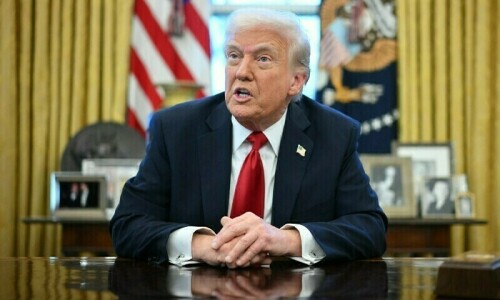The Indian Election Commission has successfully completed national level general elections in the world’s biggest democracy. Spread over two months, the elections were completed in nine phases.
A total of 550 million voters used their right to vote, which they exercised in favour of the right wing Bharatiya Janata Party (BJP). When the results were being counted on Friday, May 17, and the initial results revealed that the BJP was on its way to securing a simple majority, the Congress party gracefully and publicly accepted defeat.
There was no exchange of allegations about rigging, either by individuals or hidden forces. No one complained of having been robbed of their mandate and no press conferences were held to threaten protests and rallies.
The election was over with the vote counting – the parties (be those in power or those in opposition) moved on to do what they are elected for, governance.
What a contrast it is to the mess called politics in Pakistan.
A year after the elections, the state has not been able to resolve the issue of how fair or unfair the elections in 2013 were and how to address the rigging allegations.
Most parties continue to beat their respective chests about the injustice done to them – even though most of them are either ruling in one province or the other.
No wonder then, the PTI (which sees itself as the biggest victim of this alleged rigging) has now taken to the streets.
Its first major gathering on May 11 in Islamabad, the party turned its guns on the Election Commission of Pakistan (ECP) and demanded the resignation of all its members. In short, it asked for a complete revamp of the commission.
It seemed as if the smaller or weaker mourners were only waiting for a signal.
Soon after the PTI’s show and “charter of demands”, the PML(Q) and Jamaat-i-Islami joined in the chorus of election rigging.
What was more unfortunate was that the ECP, which had paid little attention to the charges of election rigging and had taken no steps to nudge the election tribunals, suddenly woke up.
It is noteworthy that those individuals who feel they have been defeated in their constituencies due to rigging can and had lodged petitions with election tribunals. These tribunals are set up in each province after elections to deal with complaints of the contestants.
Under the Representation of the People Act, these tribunals are supposed to dispose of all these petitions within 120 days. Clearly, these tribunals have failed in their job. For instance, the PTI claims that its petitions, which are more than 60, are still pending in the tribunals.
But no steps were taken by the ECP till the PTI’s show in Islamabad. Since that rally, the Commission has now woken up.
For example, on May 12, a day after the rally, the ECP sought a detailed report from all elections tribunals on the status of the petitions pending with them within a week.
A few days after this, the ECP bosses decided to take action against voters if it found hard evidence that they had cast their vote more than once.
It has also announced that those presiding officers, under whose watch an improbable 100 per cent votes were cast in their respective polling stations, should also be investigated.
All good steps, these. However, the question that arises is why the ECP did not take these steps earlier. And it is now appears as if the ECP is doing this under pressure; in other words it did not carry out its duty till it was forced to.
Responding to the query, former secretary election commission, Kanwar Dilshad, said the ECP, just like its Indian counterpart, was fully empowered to take action at every level on complaints, whether they surface on the day of election or afterwards.“Consider Article 103 AA of the Representation of the People Act which allows the ECP to take ‘summary action’ on a complaint or on the basis of evidence within 60 days. And the presiding officers, on the day of elections, enjoy judicial powers,” he said.
He added that: “The ECP has failed at the implementation of the prescribed rules.”
His views appear to be shared by some in the ECP.
An ECP official, who spoke on the condition of anonymity, told Dawn that never before had the ECP been targeted in this manner by a political party, which had also pushed persistently for electoral reforms. Earlier, he said, political parties would target “hidden hands” or accuse “the establishment” of influencing election result but “the ECP has not been accused of being the cause of the irregularities carried out on election day.”
It remains to be seen if the ECP will now emerge from this mess, stronger and better than before.
Published in Dawn, May 23rd, 2014










































